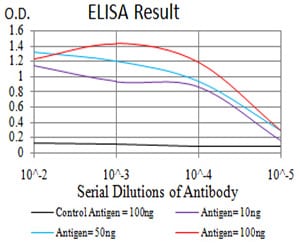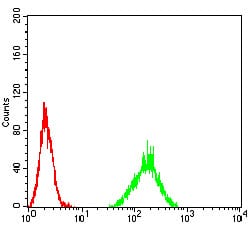

| WB | 咨询技术 | Human,Mouse,Rat |
| IF | 咨询技术 | Human,Mouse,Rat |
| IHC | 咨询技术 | Human,Mouse,Rat |
| ICC | 技术咨询 | Human,Mouse,Rat |
| FCM | 1/200 - 1/400 | Human,Mouse,Rat |
| Elisa | 1/10000 | Human,Mouse,Rat |
| Entrez GeneID | 467 |
| clone | 5A9B9 |
| WB Predicted band size | 20.6kDa |
| Host/Isotype | Mouse IgG1 |
| Antibody Type | Primary antibody |
| Storage | Store at 4°C short term. Aliquot and store at -20°C long term. Avoid freeze/thaw cycles. |
| Species Reactivity | Human |
| Immunogen | Purified recombinant fragment of human ATF3 (AA: 1-181) expressed in E. Coli. |
| Formulation | Purified antibody in PBS with 0.05% sodium azide |
+ +
以下是关于ATF3抗体的3篇参考文献及其摘要概括:
---
1. **文献名称**:*ATF3 regulates the stability of PD-L1 in head and neck squamous cell carcinoma*
**作者**:Wang, C. et al.
**摘要**:本研究通过Western blot和免疫组化分析ATF3在头颈部鳞状细胞癌中的作用,发现ATF3抗体用于检测其与PD-L1蛋白稳定性的关联,揭示ATF3可能通过调控免疫检查点分子影响肿瘤微环境。
---
2. **文献名称**:*Activating Transcription Factor 3 (ATF3) is a Highly Conserved Pro-regressive Factor in Mammalian Axon Injury Models*
**作者**:Seijffers, R. et al.
**摘要**:研究利用ATF3抗体进行免疫荧光染色,发现ATF3在神经元损伤后的轴突再生中起关键作用,抗体特异性验证显示其在多种哺乳动物模型中表达上调,提示其作为神经修复的潜在靶点。
---
3. **文献名称**:*ATF3 mediates inhibitory effects of ethanol on hepatic gluconeogenesis*
**作者**:Kim, J.W. et al.
**摘要**:通过ATF3抗体进行染色质免疫沉淀(ChIP)和Western blot,证明乙醇通过诱导ATF3表达抑制肝脏糖异生,揭示了ATF3在代谢调控中的新功能,抗体应用确认了其在肝细胞中的DNA结合活性。
---
以上文献均明确提及ATF3抗体的实验应用(如Western blot、免疫组化等),并围绕ATF3在癌症、神经损伤及代谢疾病中的作用展开研究。如需具体DOI或发表年份,可进一步补充检索。
ATF3 (Activating Transcription Factor 3) is a stress-inducible nuclear protein belonging to the ATF/CREB family of basic leucine zipper (bZIP) transcription factors. It plays a dual regulatory role in cellular responses to stress, inflammation, DNA damage, and metabolic disturbances, acting either as a transcriptional repressor or activator depending on cellular context and binding partners. ATF3 expression is typically low under normal conditions but rapidly upregulated by diverse stimuli, including cytokines, hypoxia, oxidative stress, and endoplasmic reticulum stress, through signaling pathways such as MAPK, NF-κB, and integrated stress response (ISR).
ATF3 antibodies are essential tools for studying its expression patterns, subcellular localization, and molecular interactions. These antibodies are commonly validated for applications like Western blotting, immunohistochemistry (IHC), immunofluorescence (IF), and chromatin immunoprecipitation (ChIP). Most commercial ATF3 antibodies target specific epitopes within its conserved N-terminal transactivation domain or C-terminal bZIP domain. Researchers frequently use them to investigate ATF3's roles in cancer (where it may act as an oncogene or tumor suppressor), neurodegenerative diseases, metabolic disorders, and immune regulation. Proper validation via knockout controls or siRNA-mediated knockdown is critical due to potential cross-reactivity with other ATF/CREB family members. The antibody's performance may vary depending on post-translational modifications or alternative splicing isoforms of ATF3.
×